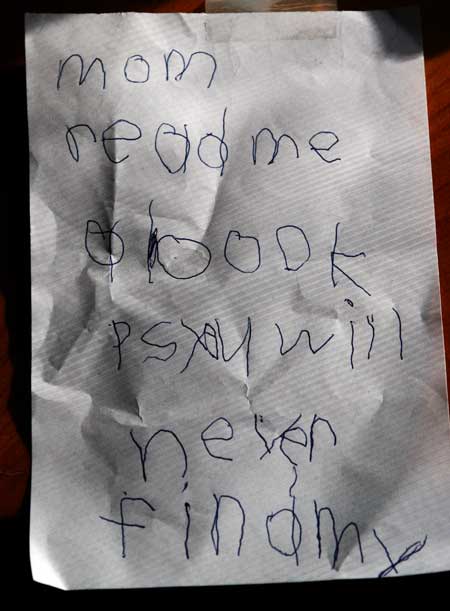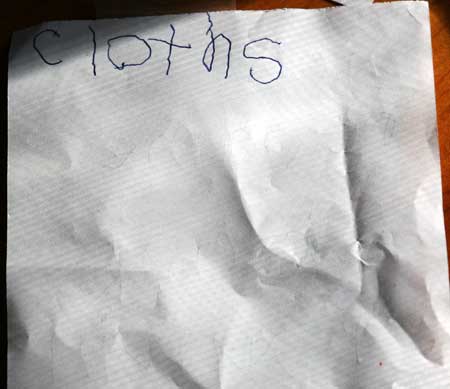When your child has enough issues to warrant an IEP (Individual Education Plan), when you discuss him time and time again with specialists, people with clusters of letters after their names and a warm child-friendly affect, you become a kind of expert yourself. You can knowledgeably discuss motor planning, auditory processing, visual motor weaknesses. What you can't always know is how best to help your kid.
Then again, neither do the specialists.
As Damian graduated from preschool to elementary school, I became aware of a powerful little word: "accommodations." If you have a child with an IEP, you can ask for his seat to be at the front of the room so he can see the blackboard better. You can ask that she be given a test in a quiet room away from the other children, or that he be given more time to complete that test. One of the most common accommodations I keep coming across for kids with Asperger's Syndrome (which, let's face it, is high functioning autism with a Germanic name), is the Alpha Smart. Your child has trouble writing? Let him use an Alpha Smart, type instead of painfully shaping the sentences on his own.
Many kids on the spectrum have trouble writing. Damian, with his visual motor issues, is most definitely one of them. Homework is such a huge, overwhelming chore for him, a ten minute writing assignment can take an hour. And that's just to get him to sit down and look at the page. It doesn't count the time spent getting his pencils to fight with each other, examining each pencil close up, dropping his pencils on the floor, and making funny noises.
He avoids the work because the work is hard. Harder for him than for your average kid. Keeping his hand steady, shaping the right letters, keeping them approximately the same size, it takes a lot of concentration. Easier to engage in pencil wars. But we persist.
Damian's speech therapist at school offered him an Alpha Smart. She didn't consult me. I would have said no. Fortunately, he turned her down. He doesn't like being different, doesn't like changing his style if he doesn't have to. Even if that style means painstakingly shaping words letter by letter. It's what he's used to, and therefore it's what he'll do. Under duress, with many protests and pencil battles, but he will still do it.
Accommodations are a tricky business, y' know? On the one hand, if something's hard for a child, harder than it should be, if that challenge gets in the way of his ability to learn, his comfort and enjoyment of school, shouldn't that difference be ameliorated? Isn't that respectful? Even necessary? A child may fail because he can't keep up with the rest of the class when the right accommodations would have helped him excel. But if we let Damian out of things that were especially difficult for him, he wouldn't be able to tie his own shoes. He wouldn't be able to climb to the top of a jungle gym. Hell, he wouldn't be able to carry on a conversation. Sometimes we have to insist he do things not despite but because they're difficult. If we let Damian off the hook for handwriting, he'd be chained to some form of computer word processor for the rest of his life. Which could make things just that much more complicated. Which he doesn't need.
So his occupational therapist works on handwriting with him, spacing and angles and control. His teacher gives him extra time to finish his journal writing every day. And we, mommy and daddy, are the heavies, making him do his homework nearly every night, yes, even the eight sentences he has to write on Tuesdays with that week's spelling words.
One night recently Dan was working late, past Damian's bedtime, leaving me solo mom. Damian was being secretive about his bedtime activities, changing his clothes under the covers of my bed. Once he was clad in pale blue pajamas covered with planets and moons, he ran out of the room with a giggle. Came back a few minutes later with this:


Translation in case you can't read the somewhat squished writing:
"Mom read me a book
PS you will never find my cloths."
(Said clothes were of course carefully hidden under the pile of blankets on my bed.)
Tell me again why he needs an Alpha Smart?
Handwriting may never flow completely easily for him, but should we have given up? I think not. Some accommodations make sense for a particular child. Others, not so much. In our rush to help, I think we sometimes end up doing harm. How to know when to step in and when to stand back, though. That's the real trick.
![]()
Come back soon: I have another post in the works to put up here, and (I hope) an essay on another site. I'm excited about that one, and I'd like to send you all there to take a look once it goes live.
last // home // next
copyright 2006 Tamar